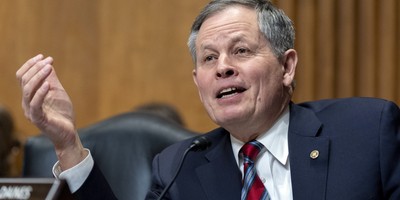According to New York Times columnist Thomas L. Friedman in his mega-selling book "Hot, Flat, and Crowded," China banned plastic bags a few years ago. "Bam! Just like that -- 1.3 billion people, theoretically, will stop using thin plastic bags," he gushed. "Millions of barrels of petroleum will be saved, and mountains of garbage avoided."
China's got us beat, suggests Friedman, because its leaders aren't hung up on democracy or checks and balances or any of the other dusty old impediments found in the American system. Friedman has proclaimed his envy for China's authoritarian system countless times. It's why he titled one of the chapters in his book "China for a Day." The idea -- he calls it his fantasy -- is that if we could just be China for a day, the experts could impose by diktat what they cannot win through democratic debate.
If only the Founding Fathers had included an annual "Tyranny Day" in the Constitution. Every 364 days America could debate and scheme, pitting faction against faction, governmental branch against governmental branch, and on the 365th day the Supreme Soviet of the United States could simply "do things that are tough" and shove 10 pounds of policy awesomeness into democracy's five-pound bag.
Now, just for the record, China hasn't banned plastic bags. Just ask anybody who's been to China recently. But what a strange thing to sell your soul for. What was it Thomas More said, "it profits a man nothing to give his soul for the whole world ... but to ban plastic bags?"
Now, I bring all of this up for a couple reasons. The first is that I am mildly obsessed with Tom Friedman. He's easily one of the most influential columnists in America and he routinely and blithely expresses his envy for a barbaric police state that has killed tens of millions of its own people. I think pointing that out is worth a little repetition.
Recommended
But it's also worth noting that Friedman is hardly alone. He may stretch his argument to the point of parody, but he shares a widespread view that the "experts" have all the answers and the "system" is holding them back.
Such arguments are as old as they are dangerous. And they are arrogant beyond description. People like Friedman automatically assume that their preferred policies are so obviously right, so objectively enlightened, that there's no need to debate them or vote on them.
Such arguments are usually deployed to avoid valid criticisms, not because there are none. Indeed, the Obama White House virtually lives by such claims. All of the experts agreed that their stimulus would work; that Obama's version of healthcare reform was both necessary and popular, that weaning the U.S. from fossil fuels will create "green jobs." The evidence on all of these fronts is mixed or weak and yet the president insists constantly that he doesn't want to hear from people who disagree with him on these issues because all the facts are in.
Such arrogance is dangerous. The literature on the unintended consequences of policies crafted by experts is at least as old as the field of economics. Frederic Bastiat, the great 19th-century economist, noted that all that separated the good economist from the bad is the ability to appreciate the possibility of the unforeseen. Nobel Prize-winning economist Friedrich Hayek demonstrated that healthy economies couldn't be controlled by experts, because the experts will always have a "knowledge problem." They can never know all of the variables and never fully predict how their theories will play out in reality.
Right now Congress is debating a financial reform bill that simply commands that regulators predict when an unforeseen crisis will occur. This is like demanding regulators know when stocks will go up or down. If they knew that, they wouldn't be regulators -- they'd be billionaires.
But forget all that. Let's get back to those evil plastic bags. A new study from the University of Arizona reveals that reusable shopping bags, the enlightened replacement for plastic ones, are breeding grounds for E. Coli and other dangerous bacteria. Roughly 50 percent of the bags inspected were found to contain dangerous, potentially lethal, bacteria.
No, this doesn't mean we should abandon reusable bags, let alone ban them too on next year's Tyranny Day. People can clean the bags and solve the problem. That's a hassle, to be sure. But that's the point. There's always going to be a downside to even the best policies, because the experts don't know as much as they think they do. Sometimes, they don't even know they're not experts at all.

























Join the conversation as a VIP Member